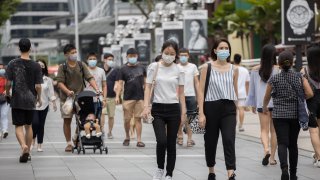
People wearing face masks as a precaution walking along Orchard Road, a famous shopping district in Singapore.
- A coronavirus vaccine won't be the silver bullet to end the pandemic, Singaporean minister Lawrence Wong said despite "promising" news from pharmaceutical firms.
- Beyond a vaccine, testing and precautions such as wearing masks, keeping social gatherings small and maintaining safe distances are "highly effective" in keeping the pandemic under control, Wong said.
- They also need to be distributed and it will take time for a sufficient number of people to be vaccinated, he added.
SINGAPORE – A coronavirus vaccine won't be the silver bullet to end the pandemic, the co-chair of Singapore's Covid-19 task force said this week despite "promising" news from pharmaceutical companies.
"We're certainly encouraged by it, it's very promising, but I would say also that the vaccine is not a silver bullet to end the pandemic," Lawrence Wong told "Squawk Box Asia" on Tuesday. "We should not put all our eggs into the vaccine basket."
His comments came one day after biotech company Moderna announced that trials show its vaccine is more than 94% effective in preventing Covid-19. Pfizer last week said its vaccine is more than 90% effective.
Wong, who is also the country's education minister, said the developments were positive, but there's still "a long way to go" before the safety and efficacy of the vaccines are ensured. They will then need to be distributed and it will take time for a sufficient number of people to be vaccinated, he added.
"We should not look only at vaccines," he said. "We really need all the tools at our disposal, and that includes testing – having more effective ways of testing beyond the 'gold standard' of the PCR test."
Money Report
Polymerase chain reaction (PCR) tests are currently considered the most accurate in detecting coronavirus infections, but can take a long time to return results.
"Developing new rapid tests that are cheaper, simpler, easier to administer, that's very important to ensure more comprehensive testing," said Wong.
He added that simple precautions such as wearing masks, keeping social gatherings small and maintaining safe distances are "highly effective" in keeping the infection under control.
"We really need all of these to come together – vaccines, testing, safe distancing, contact tracing," he said.
Third phase of reopening
Asked when Singapore would enter the third stage of its reopening, the minister said the conditions have to be right.
"This is like … a fire that has just been put out. The embers are still around, and it only takes a small spark to get the fire raging again," he said.
Singapore went into a partial lockdown in April and has reopened its economy in phases since June. Phase two started in mid-June.
"When can we get to phase three? I've emphasized this, that it's not about rushing into phase three, but making sure that we do it right," Wong said.
Singapore is likely to allow bigger social gatherings and increase capacity limits for public venues such as museums in the next step of reopening.
The minister outlined three factors that need to be in place and where the country stands:
- Effective testing capabilities
"On testing metrics, we are doing quite well," Wong said. The country has reached its target capacity of 40,000 tests a day and is continuing to deploy both PCR tests and rapid antigen tests. - Continued vigilance in the community
"For the large part, I think we're doing well," the minister said, noting that there are occasional cases of people breaching the rules. He added that this is an ongoing measure of Singapore's "continued cooperation and compliance." - Contact tracing abilities
Around 50% of the population has downloaded the TraceTogether app or is using a token that allows Singapore to identify people who have been in close contact with confirmed coronavirus cases. "We aim to get that to around 70% or higher, and we think we can get there by the end of the year," Wong said. "Perhaps it will take a bit longer, but that's the current timeframe that we're working on."
"We will do our darndest to go through phase 3, resume activities progressively without having to enter into another circuit breaker or lockdown," he said. "I don't think anyone wants to go through that again."

